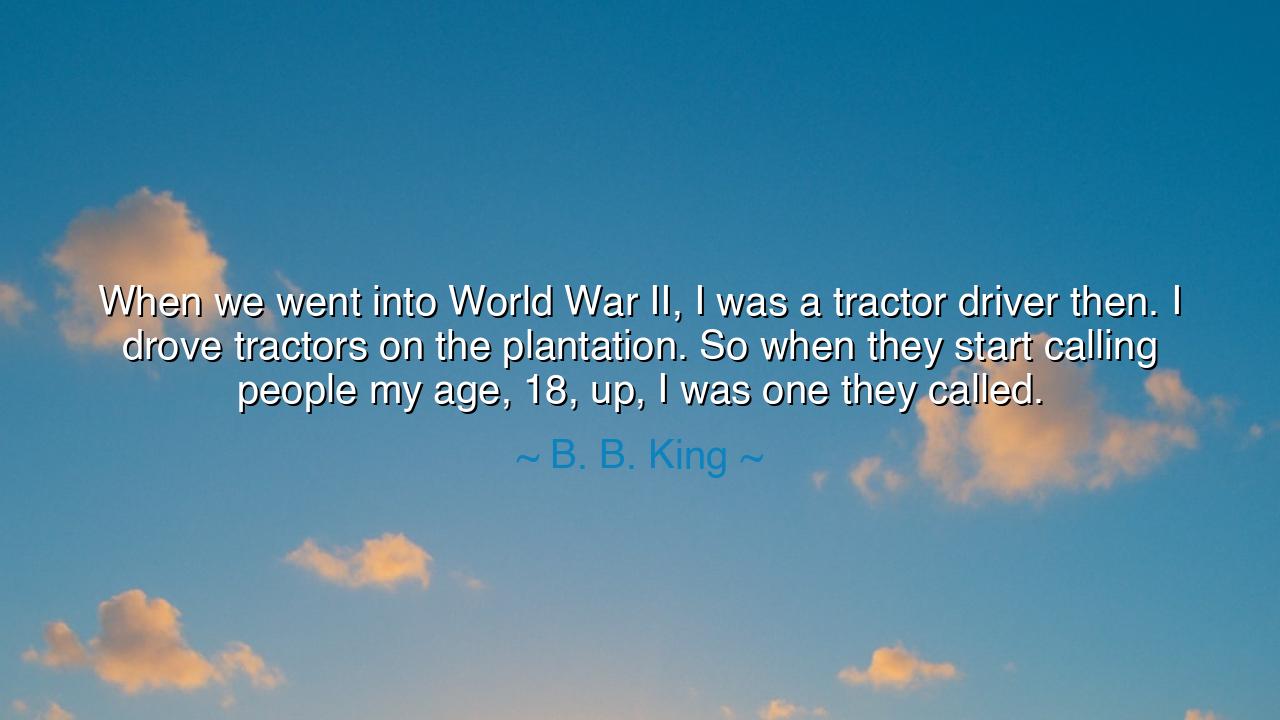
When we went into World War II, I was a tractor driver then. I
When we went into World War II, I was a tractor driver then. I drove tractors on the plantation. So when they start calling people my age, 18, up, I was one they called.






"When we went into World War II, I was a tractor driver then. I drove tractors on the plantation. So when they start calling people my age, 18, up, I was one they called." – B. B. King
In the grand theater of history, there are moments when the fates of ordinary men are entwined with the thunderous events that shape the world. B. B. King, the legendary blues guitarist, offers a glimpse into such a moment—one where a young man, on the brink of adulthood, is swept into the storm of war, not by choice, but by the relentless call of duty. World War II, that cataclysmic conflict, demanded the lives of millions, and even those who were tilling the soil, driving tractors on humble plantations, could not escape its grasp. At the age of 18, a time when one’s life is filled with promise and possibility, B. B. King found himself summoned, not to a life of music, but to the front lines of a war that would forever change the course of history.
This moment of transformation, from a tractor driver to a soldier in a world at war, reflects the broader story of the countless young men who, throughout history, have been called from their daily lives into the maelstrom of conflict. It is a theme seen in ancient times, when the great empires of the world raised their armies not just from the ranks of the professional soldiers, but from the very heart of society itself. Take, for example, the Greek hoplites—farmers, craftsmen, and tradesmen who, when the horns of war sounded, dropped their tools and took up their weapons. Their lives, like that of King, were not their own to dictate, for they were bound by the circumstances of their time.
In the case of B. B. King, his words are imbued with the raw emotion of a young man whose path was altered by the forces of history. Tractor driving, a humble and often thankless job, represented a life of simplicity, but it also represented hope—the hope of stability and the possibility of a future of his own making. Yet, as with countless others, the call to war shattered that hope. War is an indiscriminate force, and it does not ask if one is ready or willing. It demands that men and women step into the unknown, leaving behind the peaceful rhythms of daily life to face the chaos of the battlefield.
There is a lesson here, deeply embedded in the narrative of B. B. King’s life: the unpredictability of fate. From a tractor driver to a soldier, and eventually to a legendary figure in music, King’s life is a testament to how swiftly and dramatically life can change. Just as the Romans and Spartans were often called from their farms and fields to fight in the name of the state, so too are the common folk of today summoned by the needs of their time. It is a reminder that no matter how far we may seem from the realms of power, we are never truly beyond the reach of the great forces that govern the world.
The ancient world was no stranger to such sudden shifts in the lives of men. Alexander the Great, before he was a conqueror, was a young man, raised in the Macedonian countryside, whose life was changed the moment he was called to arms by his father, King Philip. Julius Caesar, too, was a man who, though born into an aristocratic family, was often forced to take up arms in the service of Rome, even when it meant abandoning his studies or his dreams. In these men, as in B. B. King, we see the power of destiny, a force that sweeps away the simple aspirations of youth and demands the full measure of a man’s courage and resolve.
But there is also a deeper, more poignant lesson to be found in King’s words. It is the reminder that even the most tragic and tumultuous moments of our lives can be transformed into something extraordinary. For B. B. King, the war did not define him, but rather, it was the experience of struggle and resilience that shaped him into the musical genius he would become. The pain and suffering of war, the loss of innocence, and the very act of survival—these became the fuel for his music, turning sorrow into soul-stirring blues that would resonate for generations.
As we stand in our own lives, at the intersection of fate and choice, we too must remember that life is unpredictable. Plans are made, dreams are dreamed, and yet, there are forces beyond our control that will shape our destinies. The true measure of a person is not found in the success or failure of their own design, but in how they respond to the world when it changes without warning. Like B. B. King, we must adapt to the calls of life, embracing what comes with courage and the knowledge that we, too, can turn hardship into something beautiful.






AAdministratorAdministrator
Welcome, honored guests. Please leave a comment, we will respond soon